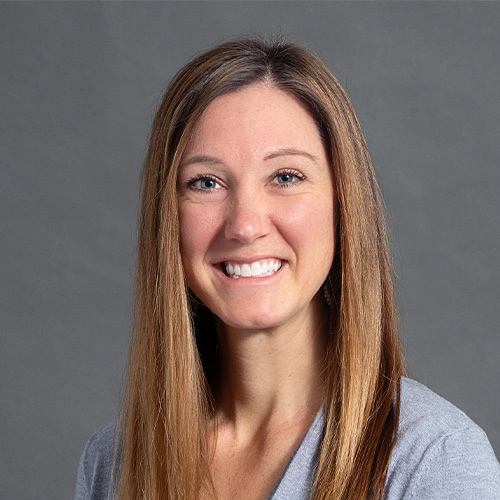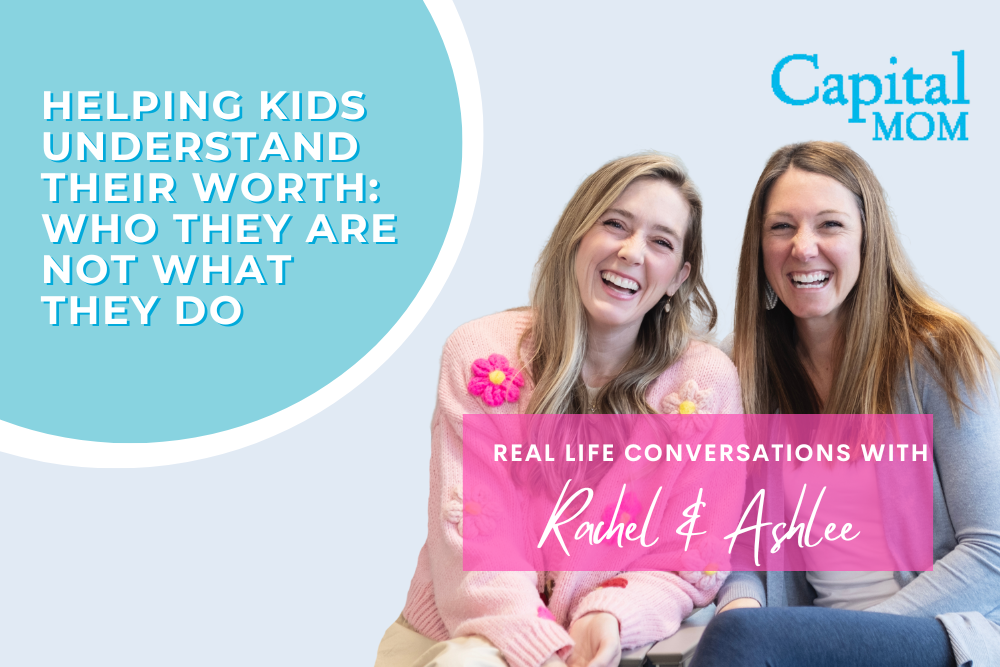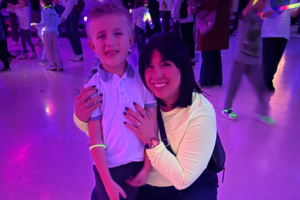Welcome to the CapitalMOM Real Life Conversation.
Today, we’re going to jump into a topic that has really been on both of our hearts, and it is making sure that our kids know that their worth is based on who they are and not what they do. So we’ll jump into that just after a Glimmer and Dimmer.
Yes. And this month, I think we both have glimmers. We might have both had dimmers last month.
Rachel’s Glimmer
Yes. So sun is shining. We’re ready for some glimmers. And mine is my daughter just turned eight. And on her– the morning of her birthday, it was a Saturday, so we were so excited to have her birthday party on her real birthday. And she woke up sick. So we had to postpone the party for two weeks.
And it ended up being the best thing that could have happened because the original party, only like, six friends could come. And the rescheduled party, she had 15 friends. And it was just the best. And so I’m just so happy for her. It all worked out the way it was supposed to work out, and it was so fun.
And she had a Wicked themed party and everybody came dressed up as Glinda or Elphaba, and it was just so cute. And it’s– yeah, it’s a glimmer for sure.
Ashlee’s Glimmer
It was really cute. I also have a glimmer.
And it is that this week, we got to celebrate my husband’s tenured and promoted party, which is such a huge accomplishment. And I am just beyond proud of him and us for fighting through the hard years of reaching that goal. So just really, really proud of him. And it was a really fun evening celebrating. So thank you.
And just a second touch on that is I think Ashlee deserves– and all the moms who are supporting their husbands and vice versa– that we just deserve so much love in that process too. It’s like Ashlee sacrificed so much so that John could work so hard and be with the kids and all of that.
And I think I feel that way with my husband. Like, he travels a lot for work. And when I have people come up to me and thank me for the sacrifice I’m making at home, it just means so much.
Who Our Children Are On The Inside
OK, so rolling into our topic– helping our children identify in who they are, not what they do. This is such a good one. And we have a lot to talk about, a lot to plow through that we have been experiencing personally with our kids.
I just think a lot of parents whose kids are involved in activities, which is a lot of people– or even if they’re not, if it’s school or whatever it is– that they are investing in how to help them identify and find their worth and who they are inside, as opposed to what they can do on the outside.
Yes. Their performance, what their performance results are. Having that not be what they’re worth. Yeah, their worth is. So we also want this to come across hopefully just as real as possible because we’re in the middle of it. We’re not preaching to you. Some of you may even be doing this better than us at this time. You know, there’s no right or wrong to this, but it’s definitely something that’s been on our hearts.
And we just hope that there’s something in this that you can take away that maybe helps you feel better about your path moving forward with your kiddos. And I just think any building up of our kids that we can do in a way that’s going to really stick with them is so beneficial. So, yeah. You want to start?
Focusing on Inherent Qualities
Yes. So focusing on qualities– on inherent qualities rather than their accomplishments and abilities. So questions that our kids might ask ourselves is like, who am I? What do I– what makes me special or unique? Or, what do I have to offer? And I think that as parents, we can really take time to compliment or even just notice things in our kids and point them out that they can reflect on later.
So some examples I have is, I love how curious you are. You notice things that other people might miss. Or you have such a kind heart, you help people feel safe and happy around you. I love how true you are to yourself. You’re not afraid to be you.
And then just simple, like I love being your mom. You’re so fun to be around. Things like that are– they will remember your voice. And as opposed to– I know a lot of kids, they’ll go to– they’ll go to a sport and they’ll come home and be like, my coach yelled at me. And it won’t necessarily be yelling, it might be correcting, but in a kid’s mind, it’s yelling. And those voices are strong in their minds of I did something wrong. I was not meeting somebody’s standard.
Words of Affirmation
And they’re in that negative headspace. So as much as we can pour those words of affirmation into our kids that are true, that we truly believe, that are their strengths, they’re going to remember those. And that’s going to play in every aspect of their life.
Yes. And I’ve actually just– I feel like I’ve been in this space a little bit now with my daughters playing softball for the first time on a more competitive team this year. And it’s been really fun, but also a very interesting learning environment for me and for her. Where she at times can– I mean, I think all of our kids can– but she can be a little more critical on herself.
But she’s also, for the first time, going through big disappointments in front of other people. Like, striking out. And having to walk back into the dugout and see your teammates and have to work through that really big emotion, it’s a big deal.
So then on your point of what we’re talking about, she had this happen just this last week. And we talked. We were able to talk on the car on the way home, or once we got home, because emotions were big. So we needed to wait for some time before I actually approached the conversation again. Aside from me just being like, I’m here, I’m proud of you.
And then we could actually talk into the specifics of it. But I was like this situation, when you strike out, and it’s so disappointing, and you get back out there? That is what courage is. You can’t feel that courage until you have that disappointment. It’s like that disappointment is so real and you’re allowed to feel it.
But I hope you can move through that into, I am so courageous because I’m getting back out there, even though I feel silly and I feel sad and I’m disappointed. And I don’t want to let my teammates down. But feeding into that, that’s– I hope you see how much courage that took and how strong you are in that.
And then if you want to make a change, there are things that you can do to help get a different result next time, but there are some things that are going to be out of your control. We can talk about that. But those kinds of experiences, I feel like we’re going through quite a bit. And those emotions are very real.
They are so very big, especially at their age. So realizing that she’s eight, so her emotions are so to the forefront of her whole experience of the world right now.
Right. And we have, as adults, we have this perspective of life. This is not that big a deal in the scheme of life. You struck out once when you were eight. But to her, it is everything. Like, this is my life. This is my world. These are my teammates. I’m letting them down. And so helping, us coming in and minimizing it, is not– like, oh, it’s not a big deal, it’s just one time, that doesn’t help. But believe me, I absolutely reacted initially because I saw her pain. You just want it to go away.
And so I was like, it’s all right. And I even was like, don’t look at the scoreboard! And I even said it kind of angrily because she was like, we’re never going to win. She was really feeling big emotions. And I responded that way. And then tried to catch myself and I did have a conversation with her afterwards because we talked about repair. And I love the art of repair so much because–
Putting Ourselves in Our Kids’ Shoes
As adults, when we put ourselves in their shoes– and it could be even an adult problem. Like, something happened at work and you’re upset. And if your husband comes home and is like, it’s not a big deal. You’re like, no, but it is a big deal. Right now, it feels big and I’m hurt and I need more than just being brushed off.
And as parents, that’s– that’s our job is to meet them where they are, help them navigate those hard feelings to get to the other side, and then feel those proud feelings. I pushed through that muck, that yucky feeling. And now here I am. And that look at that courage it took to get here. Yes. And I think one of the things that allows for that to happen is time.
Navigating Busy Activity Schedules
That’s one of our other things that we were talking about is the busyness of things lately, just with life, activities. After activities, sports that are not seasonal anymore. Real challenges that I feel like we’re facing as parents of, how do we navigate this, their interests, and this non-seasonal sports world that we’re in? everything expects more.
And you have to make these big choices when your kids– Ashley and I were talking about, our kids are still in the exploring stage. Like at eight years old, seven years old, even nine and 10, they don’t know yet, what they love. They don’t know what they’re going to love.
And we have to let them have the opportunity to explore things.
And that’s what makes it really hard right now in this world. It’s like they want you four nights a week or three nights a week, and then, that’s all you’ve got. And so, it’s very hard.
Yeah. If you want to have any family time or any downtime at all, then yeah, it’s really hard to then be a multi-sport kid, which my family, we grew up doing that quite a bit. And we lived in a smaller town, but it just was different.
I think that was more common back when we were growing up too, is like they had their seasons. They had basketball, then they did football, then they did whatever it may be. And now, that feels a little more obsolete. And that’s what’s really hard about the time that we’re talking about, is kids need time to actually reflect.
Preventing Burnout in Our Children
Do I like this sport? Is this something I enjoy? Is this something I want to keep doing?
And then, if they don’t have that time to think about it and they’re just going through the motions year after year, that’s where burnout happens. I’ve seen that happen time after time. I used to be a PE teacher, so I’ve seen that time after time, where kids would quit when they were 12 or 13, because they were just done.
And that’s sad, too, because they were talented and passionate for all those years. And then, all of a sudden, they’re just like, meh. And I do recognize that there are some kiddos that are going to love certain things, and that’s going to be their thriving grace. And that’s so great, because that makes it easy.
You’re like great. You want that. Let’s do it. And like, it’s not such a big push to try and get you out the door. So some kids are going to thrive with that, and you maybe have found like, the right team or the right coach or whatever that is, and it’s just such a positive environment. And that’s like, I celebrate that with you.
But for when you’re feeling those things out and you’re trying to figure that out and allow for variety and allow time for that, I just do feel that, that space of giving them time to process, and know that I hear them, and what they’re interested in right now– maybe, like, taking the pressure off of ourselves too, that, it’s going to be our fault that they can’t make it off the team the next year. Or not next year, but that they’re not going to make it onto whatever team they want when they get there because I didn’t prepare them the way that they needed to be. Like, that feels like a very real pressure right now, too. But I–
Parents feel a lot of pressure that kids have no idea.
I know, but I think the kids can feel that pressure from us. And so, if I feel that, and maybe even there’s a high cost environment involved with some of these, there’s pressure that I feel as a parent. I’ve made an investment. And then my kids don’t know the difference between my stress from investment and pressure, parental pressure of my own that I put on myself or with the environment that it is right now, or if they are feeling that they’ve let me down. That they’re not performing up to par for my standards, but that it’s not.
I just think that pressure, they don’t maybe know the difference. They sense my stress. They sense my anxiety and they want to help me. They like, want me to not feel that way.
And it’s such– it’s so sweet. But at the same time, that’s the exact opposite environment that I want for them. I actually want to be there for them. I want to encourage and be building them up. I don’t want them to be making choices so that my life is easier.
Right.
I don’t want it to have to be that scenario.
Yeah. So when I– I did gymnastics and dance. Those were my two main sports, and I ended up having to choose between the two. And I was able to do both through eighth grade, which would be like unheard of now. Like, now, you got to pick by like, fourth grade.
Yes, yes
But I was ready to be done with gymnastics because it started getting too scary for me. And I had expressed this to my parents. We would have come– I remember, I would come home, and we would sit on the couch and talk night after night after night about, what are you afraid of? But you’re so good at it.
And they’ve put in this huge investment of time and money and watching me. And they were invested in my progress and just, all of it.
But I had said, I’m done. Like, I just, I feel done. I am scared, and I can’t do it anymore.
And I kept doing it for probably, an extra full year of having these conversations at night before my parents were ready for me to be done. And when I actually told my parents, we were talking about this, my mom just yesterday apologized.
She’s like, I’m so sorry. Like, I know that you were ready to be done, and we pushed you to keep going, because we felt so invested. And that’s so real. Like, as parents–
It’s so real.
And now, as a parent, I understand I’m like, I totally get it. I totally get it. And it’s OK. Like, I’m OK.
But it’s also a lesson too, for me, is like, I don’t want to be the reason that would happen to one of my kids. Like, hopefully, if I can have that perspective now and share that with you, as well.
Yes. And of all the things. Like if I stop and really think and this big perspective, all the time that I’m investing into the sports activities, if it’s not serving this greater purpose that I hope for my kid, which is like, who are you becoming?
And is this matching the things that I want for you, like, to become, so that when you come up to challenges, you know how to work through that challenge, and face it, and feel courageous about it, or you know how to encourage your teammates, and how to respect a coach, and how to work hard?
Learning to Win and to Lose
Like, things like that. And I haven’t said winning once.
Yes. Yes.
I haven’t, because I do think that winning will come.
Yeah. And losing will come.
That’s part of it.
I don’t want that to be what defines them in the end.
And I kind of saw that with my daughter this first tournament that she had. And I’m grateful now that we get to work through that together. We have a good enough relationship where we’re like working through that together now. But it was very much a win-lose, and felt really, really sad about the loss. That was the only focus of it. I’m grateful to be able to use that as an opportunity to have the conversation.
And I’m glad she’s open and willing to have the conversation too, in pieces, parts. Obviously, she’s eight, so we’re still comprehending so much of this. I just planted a seed, actually, with my son the other day. He’s playing soccer right now, and it’s his first team sport that he’s really done. And he loves it, which is so great.
But we were talking about soccer. And he’s like, I’m going to win every game. And I was like, “Oh, do you think that’s how it works?” And he’s like, “Yeah, I’m going to win every game.” And I was like, “Oh, interesting.”
So we kind of talked about how every athlete wins and loses. Like, there will be times when you win, and there will be times when you lose. There will be times when you score a goal. There will be games you don’t score a goal. And we are proud of you no matter what because of how hard you worked, or how you treated your teammates, or all these things that we’re talking about.
And I was bringing up– my husband is a gymnastics coach, so my kids know some of the guys on the team. And this was such a good example that my husband teaches his college as athletes. He would have kids who would fall kids.
To me, they’re kids. We’re actually old.
Yes.
But he would have athletes who would fall off an apparatus in gymnastics. And their natural would want to be to feel upset. It’s like striking out.
You’re like, oh, I just let my team down. I let myself down. I lost a whole point of my score. Like, it’s a big deal.
And it’s very real. Yeah.
And so, they’re walking away, and they’re like, mad and happy. It’s all over their body language.
And my husband is teaching them, uh-uh, that is not acceptable. Like when we fall off an apparatus, what he encourages them to do is actually to start clapping, and to get pumped. And if their teammates see them fall off, everybody starts clapping. Like, come on got it.
And they’re changing that from like, uh, to OK, let’s go. Let’s get back up there. I got this. You got this.
Yes.
We’re here together in this.
No matter what the outcome is. Yeah.
Exactly. And I’m explaining that to my five-year-old. And I can tell that he’s like– Because he’s seen it. He’s seen people fall off the apparatus, and he’s seen them get back up. And I just think that’s a huge lesson–
So huge.
–in any sport, in anything you do.
Aspect of life.
Yes, in any aspect of life.
Apply for a job and you don’t get it.
Yes.
You get back up. Like, OK, how do I switch it up for next time? What do I need to do to change that?
But the way that you do it is huge.
Yes.
Because you can– I mean, truly, it’s actually inspiring to watch that. When you see someone fall and instead of slumping and changing their whole body language, they are, like, OK, let’s go. Like, I’m going to turn this around.
And you’re like, look at that. That’s amazing.
I know.
And it’s a huge life skill. And getting there– getting to that point is huge, and can help others get there.
Yes. And with my daughter’s softball team, they won their first game or two games. I don’t remember how many they played that night. I think it was the first couple games.
And the other team, I had never– I haven’t seen this done before. The other team made a tunnel, where they put their hands up, and they made a tunnel going into the dugout, saying “2, 4, 6, 8, who do we appreciate?”, so the team could run under. And so the losing team did that to our team. Our team, don’t think had ever seen, at least I had never seen that before.
And it was like the most touching thing. Like, it totally inspired me.
So then this last tournament, where they lost big time to this really good team, like lost big, they went over to their dugout, and they did it. I’m such a sucker for this.
Like, they did “2-4-6-8, who do we appreciate,” to this team that had just crushed them.
Yes.
But like, it absolutely changes– I really believe that it changes your brain chemistry to be like, that’s not what my work is based off of, whether we won or we lost. But let’s talk about, what are the wins that– what are my individual wins that I have, and what are the wins that we had as a team? Like, let’s talk about that.
And then, yeah, did we not get all the points that we wanted, and we didn’t hold them back enough? Yeah.
But, what are we going to do for next time? Because this win or this loss does not define me. My worth is not based on whether I am winning or whether I am losing.
Yeah.
Are the wins fun? Heck yes. We love to win.
Yeah.
It’s really fun. I’m competitive, too.
Yes.
It is so fun.
Yeah.
But when it starts tearing me down internally or I watch my kids feeling that way, I want to help create a better environment for them.
There is a quote that I love. I’ve been helping with our school garden club, so I’m sure that’s why this is partly on my mind.
But it says, “If a flower isn’t growing, if it isn’t blooming, you don’t change the flower. You change the environment that it’s growing in.”
So if I want my kiddo to feel differently or approach things differently, then, as a mom, like, I’m a keeper of their environment. And what an honor and responsibility. But I helped– I get to help create whatever that nurturing environment can be for them, so that they can grow and bloom.
And if it’s not working, change it.
Yes. And if it’s not working, I don’t have to beat myself up about it. I’m learning and growing too, so just adapt. I can adapt, and I can change, and we can repair, and we can–
Absolutely.
–pause and take time to work through and help create– work through this, who are we becoming, as opposed to having it feel like it’s all based on how I’m performing.
Totally.
Did I perform well?
Yeah. So I told my daughter that we were talking about this, and she had just gotten her back handspring this week at gymnastics, which is so exciting. We were so happy for her.
But I said, we’re going to talk about identifying and who you are, not what you can do. And she– This is what she said– She goes, “So like, I did my back handspring, but that’s not why you love me.”
And she said, “But you’re proud of me?” And I said, “Yeah. Why do you think I’m proud of you?”
And she’s like, “Well, not because I got my back handspring, but because I worked hard at a goal, and then you celebrated with me.”
And I was like–
Yes.
–that’s it. That’s what we’re talking about.
That’s it.
Yeah.
That’s it.
So yeah, it’s just crazy. Like, my eight-year-old, like she– I feel like she gets it. Like, this is a huge life– like it’s a huge life skill to understand and accomplish– not to accomplish, but to understand.
Yes, but I think it’s the one that will go with them. Because they get into high school, and they don’t make the team that they hoped for, then can they readjust and shift?
Right.
Or was that where they put all their eggs? Did they put all their eggs in that one basket? And if so, then are they going to feel empty-handed when they switch somewhere and feel scared and like, well there’s no other option?
I don’t want my kids to feel like they don’t have options. I want them to feel like the world is literally, their oysters.
Open doors everywhere.
They’re everywhere. Everywhere. This doesn’t have to be the only thing that you do, and it’s certainly not the only thing that defines you.
Absolutely.
Our things that we do with our kids, like these activities that we sign them up for, ultimately, I sign them up to help them learn how to be healthy. They’re active, movement.
We talked about movement last week or last month, so things that help us be healthy.
Play games, learn to play games with their friends. And when we engage in play, we learn lessons like, 20 times faster.
Absolutely.
Like, that is–
Than sitting here preaching it.
Yes, yes. And they learn and grasp things so quickly when they learn it in a game.
Yeah.
We’re learning how to win and lose, and how to cheer on and to be cheered on. Like, that’s why we sign– I signed up, and that’s why we started doing physical things in sports and stuff like that. To come together and be teams. And yeah.
So we’re going to go over just a few more things, and we’re almost done. But kind of, ways that we can help our kids large-scale look at this.
Yeah.
So encouraging self-expression, so encouraging our kids to reflect and look inward and see, what do I like? Not, what do my parents like, or what do my parents want me to do, or what are my friends doing? What do I like. And helping them understand that everyone is an individual, who has different talents and different gifts.
And they might not know what they like until they try something. And so they might be like, yeah, I want to try it because my friend’s trying it. Great.
Yeah.
So I’ll get– I have an awesome example here in a second. But nurturing self-awareness, so talking about values and choices, sharing what we notice.
Like when you are doing this sport, I’m noticing you, whatever it may be. Your grit, your work ethic, your teamwork. Those positive traits that come out through this sport.
That can go across all aspects of life, not just one sport.
Promoting self-acceptance, so celebrating their uniqueness, and celebrating other’s uniqueness. Our girls are great friends, and they are nothing alike in terms of what they’re interested in, and they can cheer each other on.
Yes.
So a really great example that happened at my daughter’s dance class. We had parent watch night, and I just loved this so much. They were working on leg grabs at dance, so flexibility. How high can you get your leg?
And my daughter is pretty flexible. She was blessed in that way. And–
And she’s working hard.
She’s working really hard. She does a lot. Yeah.
It’s not all just–
But it’s focused on flexibility.
Yeah.
So it really helps.
It’s not all just talent. Like, she’s worked really hard.
But her teacher had said, hey, there are going to be people in this room who are leg girls, who are flexible. They are going to be able to get their leg up by their head. If that is not you and you are beating yourself up right now, stop it.
And I love this, she was so serious. She said, everybody in this room has different gifts.
And there are going to be flexible girls. There’s going to be girls whose gift is their facial expressions on stage. There’s going to be girls who are turners. There’s going to be girls who are sharp. There’s going to be girls who are the people who get everybody pumped up.
Like, everybody has a gift. And if yours is not flexibility, that’s OK.
Does that mean you stop working hard on your flexibility? No. You’re still going to work hard.
But if that’s not your gift, don’t beat yourself up right now.
And I was like, as parents, I’m just sitting there like, I loved that coach.
Preach.
Yes.
It’s so good.
But a coach was not only coaching our outward child. It wasn’t just, point your toes, pull your leg up higher. Let’s go.
They were actually working on the inside. Like– And a coach who can do both, who can coach how to swing a bat and how to pull your leg up, but also working on what makes you a good person, and helping you understand a bigger perspective, that is how– that’s the kind of coach you want for your kid. Yes.
So I just walked out of there just like, oh, that was amazing.
Yes.
Yeah. Anytime you can find a coach that is coaching both is huge. Yeah. Both parts of your child.
Yeah. And huge– huge thanks to all the coaches out there, because you are out there on top of your family time and–
Absolutely,
–like, we are so grateful.
It’s a sacrifice.
It is. It is.
No, I just love that. And we ultimately, were just talking about how, as far as what they do and winning, like winning will come. But like, who they are becoming is the real goal that we hope for. You know, that is what, at least is in our hearts and on our hearts right now. If this has spoken to you at all, we’ll be grateful, if it’s made you think a little bit more about some of these things.
But just know, again, we’re right there in it with you, and–
Thinking about it every day, doing our best.
Trying to figure out– yeah, trying to, yeah, trying to be more connected with our kids and help build them up in ways that is going to carry through with them, no matter what activities they choose.
Yeah.
OK.
You don’t have to do motherhood alone. Come join our village, exactly as you are.

Ashlee Hendricks
Real Life Conversations Host
I am a mom to three awesome kids: Ellie, Anna, and Levi. My husband Jon works as a professor at the UNL Business College. While we are not natives to Lincoln (this year marks five years in Nebraska), I did grow up on a dairy farm in southwest Missouri and feel quite at home here. I work as a full-time mom and a part-time nurse at a clinic here in town.
As a family, we are happiest outside and having adventures. We lived in South Carolina before moving here so we’ve had to toughen up quite a bit! We love biking, camping and anything involving water. I have been supported and inspired by so many amazing women and men along my parenting journey. Rachel and I have talked a lot about our shortcomings and wins as moms. I hope as we share some of our story that you’ll find some relatable information that can nurture and inspire you wherever you are on your journey as a parent. We are all in this together!

Rachel Robinson
Real Life Conversations Host
I was born and raised in Lincoln. I am a stay-at-home-mom to three amazing kids named Ellie, Brecken, and Finley. I worked as a PE teacher at Scott Middle School for 8.5 years and turned into a SAHM when my second kiddo was born. I love being home with my kids. It is so fulfilling to me to be home with them through each stage, to care for them and to be a part of the little details and the big moments in their lives.
My husband, John, is a men’s gymnastics coach at the University of Nebraska. Our kids love to go to the gym and play. We love that they now have a relationship with the college athletes. It is really fun. Go Big Red! I am very excited to be chatting about things motherhood here on CapitalMom. I hope you enjoy and are able to relate as we share our motherhood journeys.









